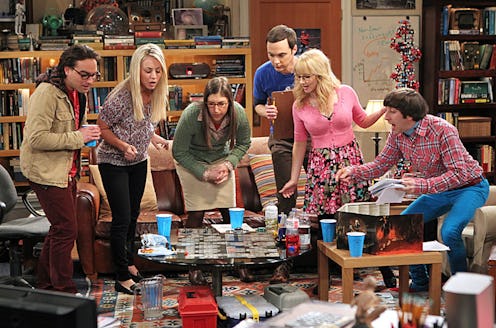Entertainment
7 TV Casts Who Asked for More Money

This time of year, most primetime TV shows are already filming the first episodes of their upcoming seasons, but one notable series hasn't even begun production; as a result of ongoing salary negotiations between the cast and Warner Bros. TV, The Big Bang Theory has delayed all preparation for season 8 until a decision is made. Meaning: as of now, at least, the futures of Sheldon, Penny, and the rest of the Big Bang crew on the show are perilously unknown.
Of course, this is almost definitely just a short-term crisis; there's no way Warner Bros. and CBS would let the most-watched show on TV go off the air just because of a little issue with money. Most likely, the network will give in to the cast's demands and resume production within the next few days, because the longer they wait to make a deal, the longer it'll be until a new episode of The Big Bang Theory will be on the air. Still, there is a chance that the negotiations will fall through, and either CBS or the cast will have a major problem on its hands. Sure, it's unlikely, but we can't rule out the possibility that come the fall, Big Bang will just be a memory of seasons past.
And it wouldn't be the first time it'd have happened to a show, even a popular one. Six TV shows who dealt with cast salary negotiations, some more successfully than others:
Friends
The most famous example of a cast negotiating their salaries as a group, the Friends ensemble banded together to demand $1 million each per episode during the last season of the show. The number may seem ridiculously high (and at first, NBC thought so), but considering how much money the show was bringing in each week, the stars felt that they deserved the increase — and they got it. Helping each other go from $22,500 an episode to $1 million? "I'll be there for you" is right.
Gilmore Girls
The stars of Gilmore Girls, however, didn't see their negotiations work out quite as well. The series was cancelled after seven seasons, and, according to Variety, the cast and network's inability to reach a deal regarding salaries was a major reason for the decision. While the failed negotiations haven't been cited as the only reasons for the show's lack of renewal, it was most definitely a factor.
Modern Family
In the summer of 2012, the show's six adult cast members entered into negotiations to increase their salaries, and ended up fighting with the network long enough to postpone season 4's production. It got so bad that the ensemble ended up suing 20th Century Fox, with the final decision going in their favor; the adults, save for Ed O'Neill (he was already earning more) nearly tripled their salaries, and while the final numbers were less than what they'd fought for, they got to receive cuts of the show's profits, as well. In return, Fox made the cast add a year onto their contracts and drop the lawsuit. As for the show's child actors, they negotiated raises, too, eventually increasing their salaries to $75,000 per episode.
Sam & Cat
When Nickelodeon's Sam & Cat was cancelled in July, the reasons weren't exactly clear; was it because of Ariana Grande's fame? Those nude photos? Or, perhaps most likely, some behind-the-scenes salary negotiations that failed to come to an agreement? While neither the stars nor the network have spoken publicly about that possibility, it's been rumored that Grande and her co-star Jennette McCurdy had asked for higher salaries and Nickelodeon responded with resistance, and, after no agreement could be made, Sam & Cat was no more.
The Simpsons
Over the course of its 25-season run, The Simpsons has undergone several major negotiations that nearly got it cancelled. In 1998, the six main stars wanted a raise from their $30,000 per episode, and Fox disagreed so much that it began preparing for new actors. Thanks to the support of Matt Groening, the cast won their raise, but in 2004, they were back to sitting out production and demanding more money, which they soon won. Four years later, the actors went on another strike, but, despite winning, they took a pay cut a few years later in order to keep the show on the air.
The West Wing
In 2011, the stars of the NBC drama banded together to negotiate their contracts after learning some of them were making more money than others. While Warner Bros. wouldn't agree to triple their salaries, as requested, they did double them, leaving each actor with $70,000 per episode and perfectly happy — except Rob Lowe, who didn't get the pay raise he wanted and left the show shortly after.
Images: CBS; NBC (2); The WB; ABC; Nickelodeon; FOX